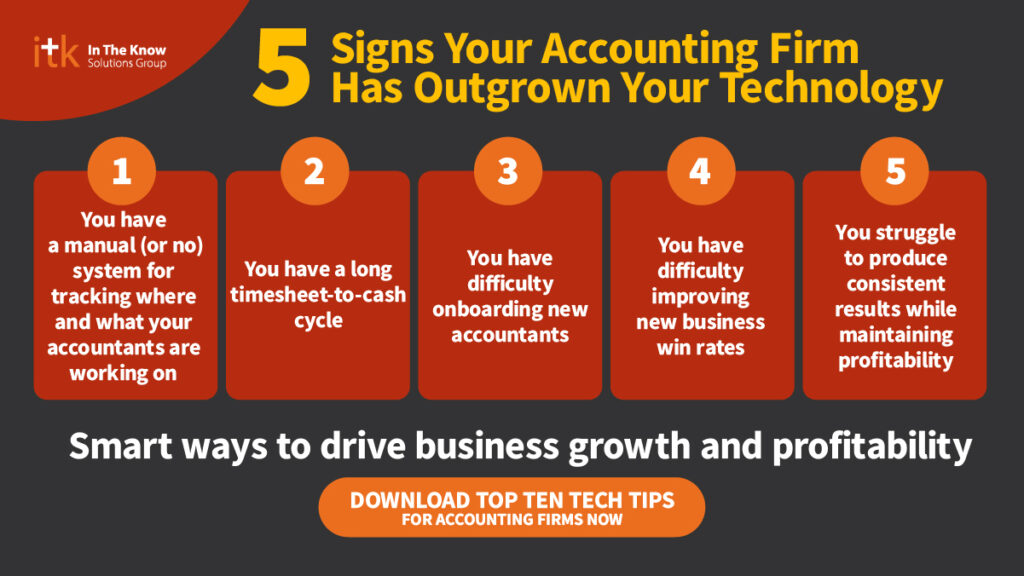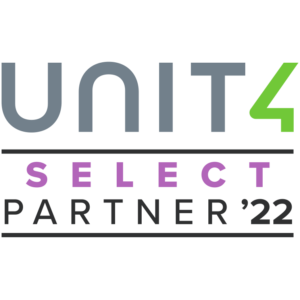Accounting is known as
the “language of business”
Here are five signs that your accounting firm has outgrown your technology.
1. You have a manual (or no) system for tracking where and what your accountants are working on.
We’ve come a long way since clay tablets. Still, many accounting firms are greatly underutilizing technology in their businesses. For example, many firms are still using spreadsheets, which may be effective for managing a handful of accountants but is problematic as teams grow and this information is needed by multiple employees in various roles.
Your team needs to be able to answer the following questions:
- Which projects are your accountants working on?
- How much of their bandwidth is required?
- When do these projects end?
- If you win a new project tomorrow, who will be available for that project?
2. You have a long timesheet-to-cash cycle
Accounting firms are comprised of diligent, focused and detail-oriented individuals. Still, it is quite common to have a lengthy timesheet-to-cash (or timesheet-to-invoice-to-cash) cycle.
Common causes of this problem fall into both internal and external hurdles.
INTERNAL HURDLES:
Accountants submit timesheets, which are reviewed by a manager, which then requires an invoice to be manually created, which then needs to be completed and reviewed, which then needs to be sent to a client… Each step creates a potential hang up, delaying the cycle before the invoice even exits your office.
EXTERNAL HURDLES:
On the client side, the invoice and may require authorization by a department head. Most companies issue payments periodically in batches or payment cycles, causing an additional delay. While billing in larger batches may seem to streamline your internal process, large invoices can cause large delays on the customer side as each invoice needs to be carefully examined. When you don’t bill customers immediately, the invoice will be larger and will likely be scrutinized more, processed more slowly, and paid more slowly.
Another potential hurdle is client cash flow issues. While not necessarily common, cash shortfalls could be minor, or a sign of bigger issues and as time goes, the invoice is less and less likely is to be paid. The lesson to be learned: Invoice early and often.
3. You experience difficulty onboarding new accountants
Finding good hires takes an investment of both time and money, but the equally challenging part occurs once they come on board. What if a new hire is replacing someone who has been with your company for many years? That’s a lot of knowledge to transfer. Most organizations do this in an ad hoc way, instead of having a set process. This is where problems occur.
A employee who has been with your company for a long time may be tasked with training the new hire. However, the trainer’s processes may be more aligned with “how things used to be done.” If you don’t have standardized processes for key activities, your new hire may be taught the best way to accomplish a key task…from ten or twenty years ago. The processes we adopt tend to mirror the technology we’re using. Make sure you keep your team abreast of your current processes and ensure that they’re confident in their use of any new software solutions.
4. You have difficulty improving new business win rates
Business win rates are based on a variety of factors. Some of them are out of your control. Here are a few that are not:
A System for Creating Project Proposals
With a standardized process, including templates covering the typical services you offer, you can turn around invoices quickly and easily and avoid “reinventing the wheel” each time. Part of having a system for proposals is knowing what to charge. You shouldn’t need to consult your team’s budget guru each time you decide what to charge for a project. When you know what to charge for different types of projects, you can take the guesswork, hard work, and stress out of creating proposals.
Generating Social Proof
An ability to generate social proof–satisfied customers who will sing your praise–is crucial to acquiring new business. When you have an ability to meet and exceed the needs of your customers on an ongoing basis, you won’t have to sell your company’s services to your prospects. Your current customers will do that for you.
The confidence that you can achieve specific results for your clients is based on your ability to achieve results consistently. Hiring the right people, with the right technical knowledge and communication skills, helps. It is equally important to have processes for key elements of your business and continually communicate and update those systems as software solutions evolve.
[JB1]Moved down since it seems to bridge to the next section/overlap a bit
5. You struggle to produce consistent results while maintaining profitability
There are two secrets to producing results. The first–hiring talented people–is just part of the solution. The second secret is to have your team follow business processes, enabling the predictability of results we just discussed. Sure, there are some elements of a project that will require creating thinking. That’s what accountants are paid for. [JB1] However, the bulk of your team’s work should be following best practices in a systematic way.
Additionally (and obviously), part of serving the customer is to remain profitable so you can continue to serve them. Profitability and predictability go hand in hand. Business processes help you predict outcomes, including how long a project will take, how much you need to charge to make a profit, and how to avoid charging too much and losing the project to the competition.
According to a Global Productivity Study by Unit4, roughly 33% of every working year is spent on administration or repetitive tasks. Managing those repetitive tasks is an opportunity to support your team and avoid putting barriers in their way.
Technology is the number one tool we have to manage repetitive tasks. It’s been said that, “Everyone needs an accountant,” and—whether 3,000 BC or today—every accountant needs a technology tool or two.
If you’d like to find out if your accounting firm is leveraging technology effectively, download our free whitepaper, Top Ten Technology Tips for Accounting firms HERE.





